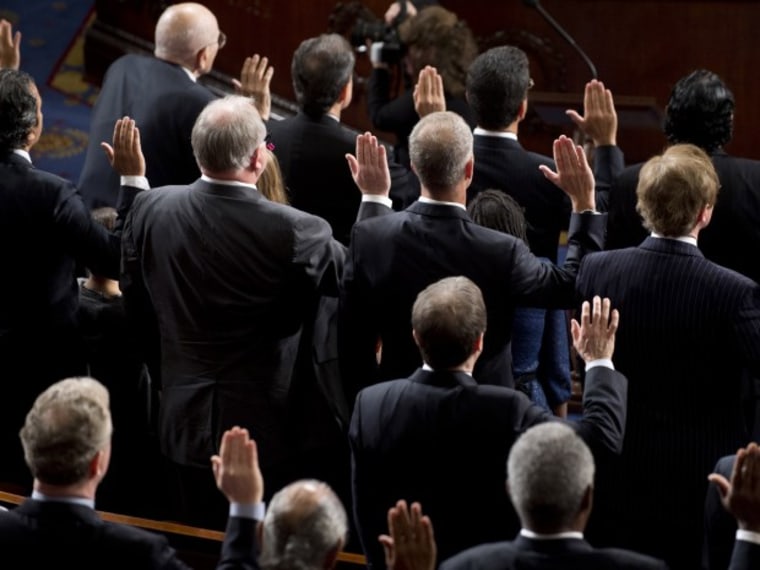Republicans' budget-cutting fever has nothing to do with the deficit. That's the conclusion reached by former Obama official Jared Bernstein and Democratic strategist Bob Shrum on Thursday night's Hardball. The Grand Old Party only cares about dismantling the welfare state, insisted Bernstein and Shrum. The debt is just a convenient excuse.
But if the Democrats don't have shared interest in cutting entitlements, then they're doing a great job of hiding it. During the last debt ceiling crisis, President Obama offered to raise the Medicare eligibility age, and during the fiscal cliff fight he quickly accepted the Republican Partys' proposal to cut Social Security.
The truth is, Democrats and Republicans alike are treating deficit reduction as a top priority, whether it is achieved purely through entitlement cuts or through a "balanced deal" which also includes some modest tax increases. This despite the non-hypothetical crises which require massive public investment right away: Crises such as our extraordinary levels of inequality, persistent long-term unemployment, a national infrastructure that's sliding backwards from first-world status, and a global climate crisis. No, the theoretical danger our deficit presents at some indeterminate point in the possible future is what demands our attention right now. And averting that danger requires "tough decisions," like withholding money from old people.
At the Columbia Journalism Review, Trudy Lieberman notes that this has become a truism in major newspapers and on Sunday morning talk shows. Lieberman cites one particularly hilarious—though not atypical—example in which the Washington Post's Lori Montgomery described the Simpson-Bowles plan as "a model of clear-eyed sacrifice."
As Salon's Alex Pareene has written, "No one actually knows or cares what’s in the actual Simpson-Bowles plan, but at this point it doesn’t actually matter." The important thing is that the plan includes some tax increases and—even better—cuts to welfare programs which Democratic constituencies tend to like, such as Social Security and Medicare. Organs of Washington consensus like the Post fetishize "sacrifice," but they use the word in a very specific way: It almost invariably comes up when politicians decide to sacrifice the well-being of the people who will continue to vote for them anyway.
Democrats have adopted the mythology of debt and sacrifice as their own. Shortly after the election, top Obama adviser David Plouffe said, “Democrats are going to have to do some tough things on spending and entitlements” in order to reach a fiscal cliff deal. And shortly before the election, President Obama himself told Morning Joe: "There’s no doubt that our first order of business is going to be to get our deficits and debt under control."
So according to President Obama and those closest to him, the deficit is not only a threat to the country's well-being but an imminent threat, or at least one which requires immediate action. That's a popular position in Washington, though there's quite a bit of debate among economists over the degree to which the deficit matters at all. Keynesian economist Paul Krugman argues that the danger of the fiscal cliff was "actually about the risk that the deficit will be too small." There's even a dissident movement within economics called Modern Monetary Theory, which posits that deficits are now virtually irrelevant.
The threat to the welfare state is not a purely financial one, and it does not come from a single party. The threat is structural and organizational. It flows out of a national political center which, though heavily polarized, shares a culture and ideology in service to elite interests. The only counterweight to that ideological pressure cannot come from within Washington itself, but the left's grassroots institutions are too scattered to provide much of the required leverage right now.
The question for the left is not whether the Democrats will suddenly become tougher negotiators, because the national party never shared the same objectives as the grassroots in the first place. The challenge, instead, is building power outside of Washington to counteract a network of interests and beliefs that transcends party.
